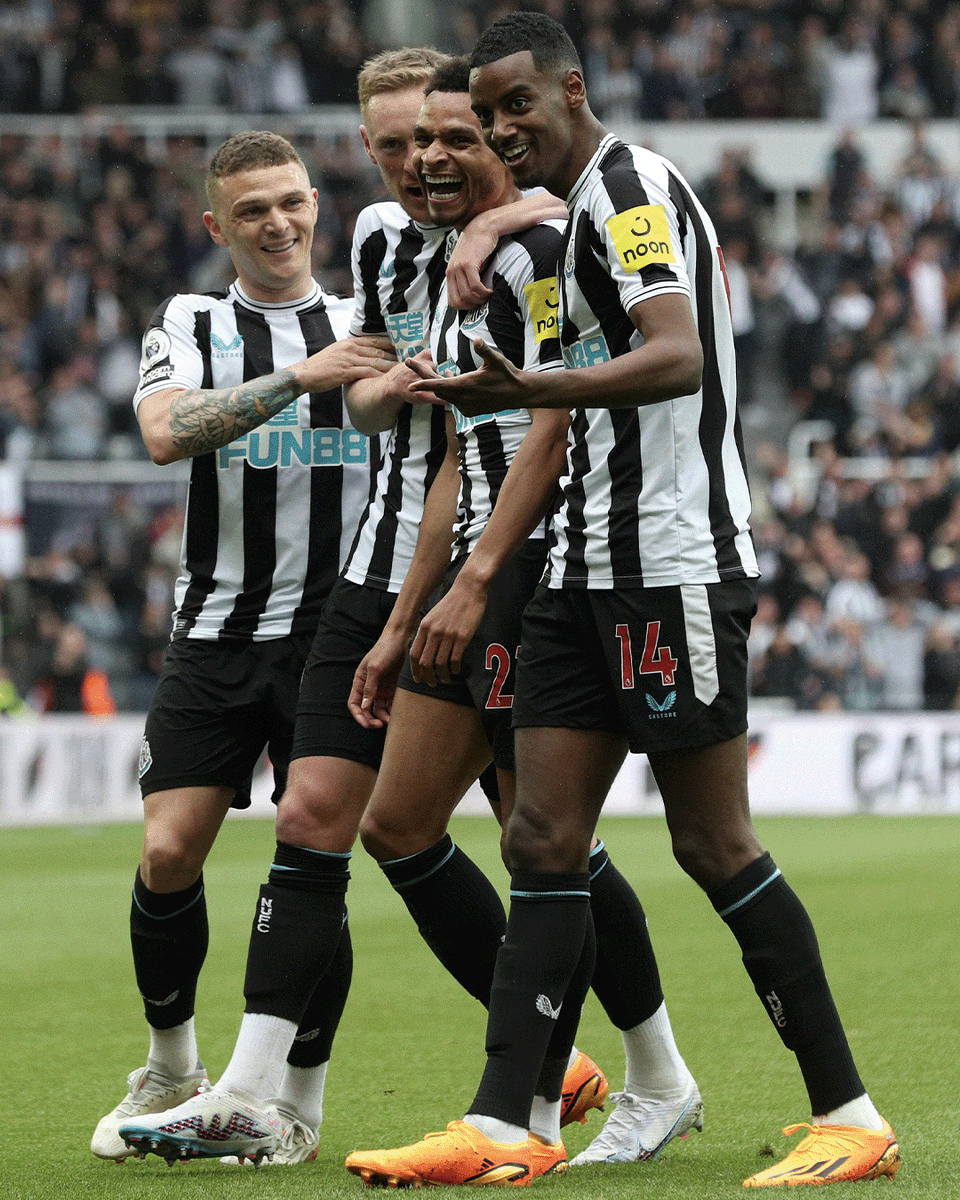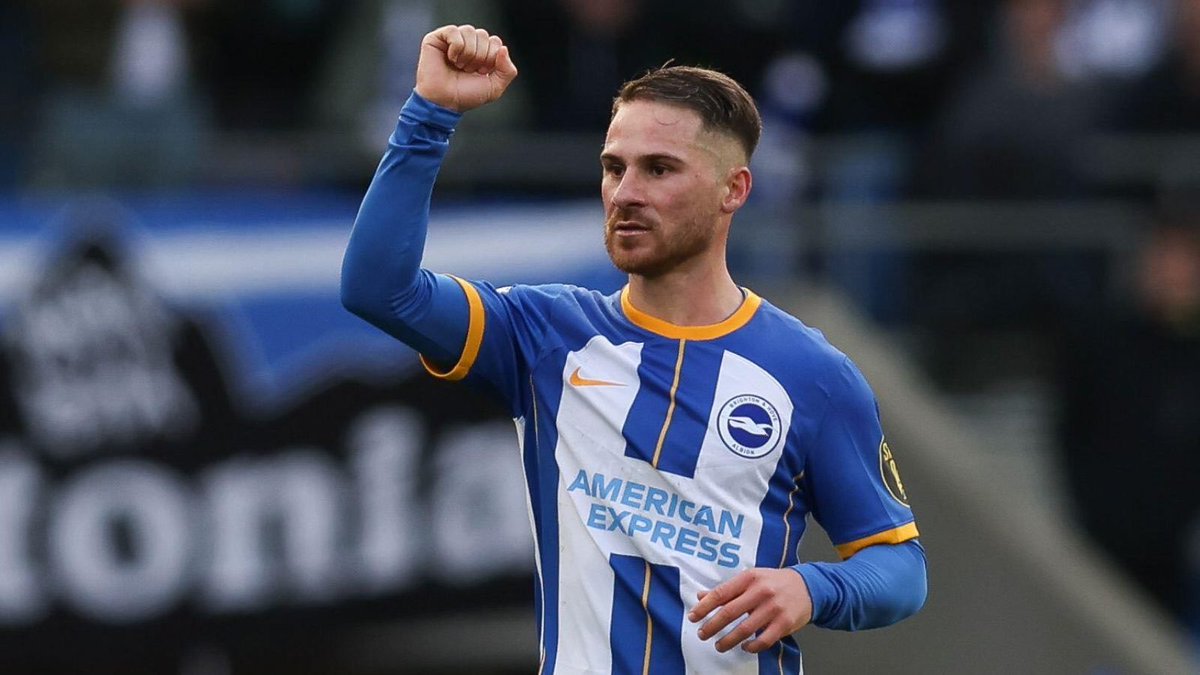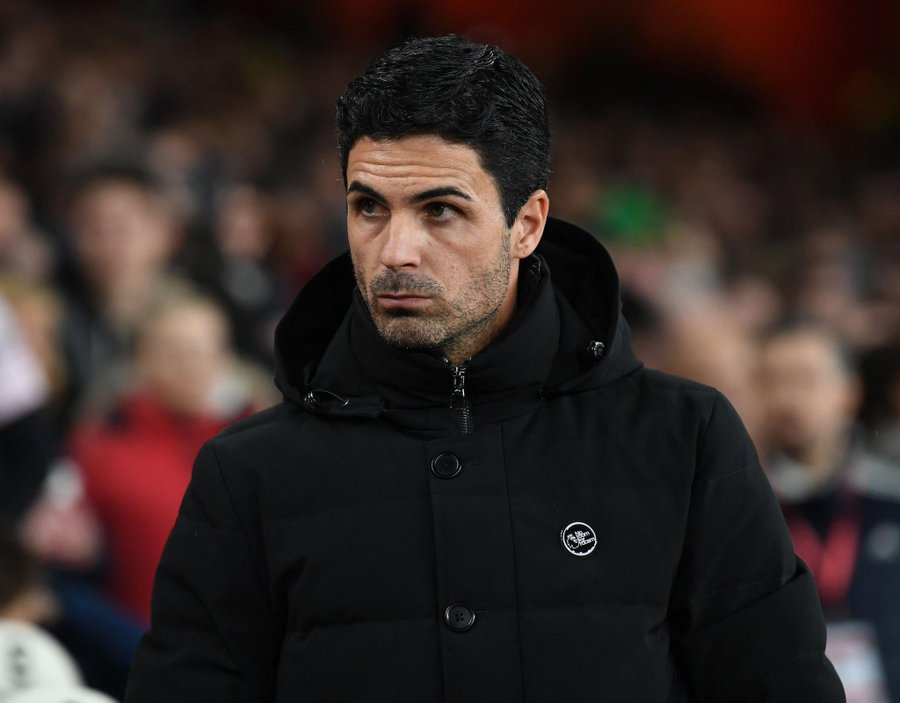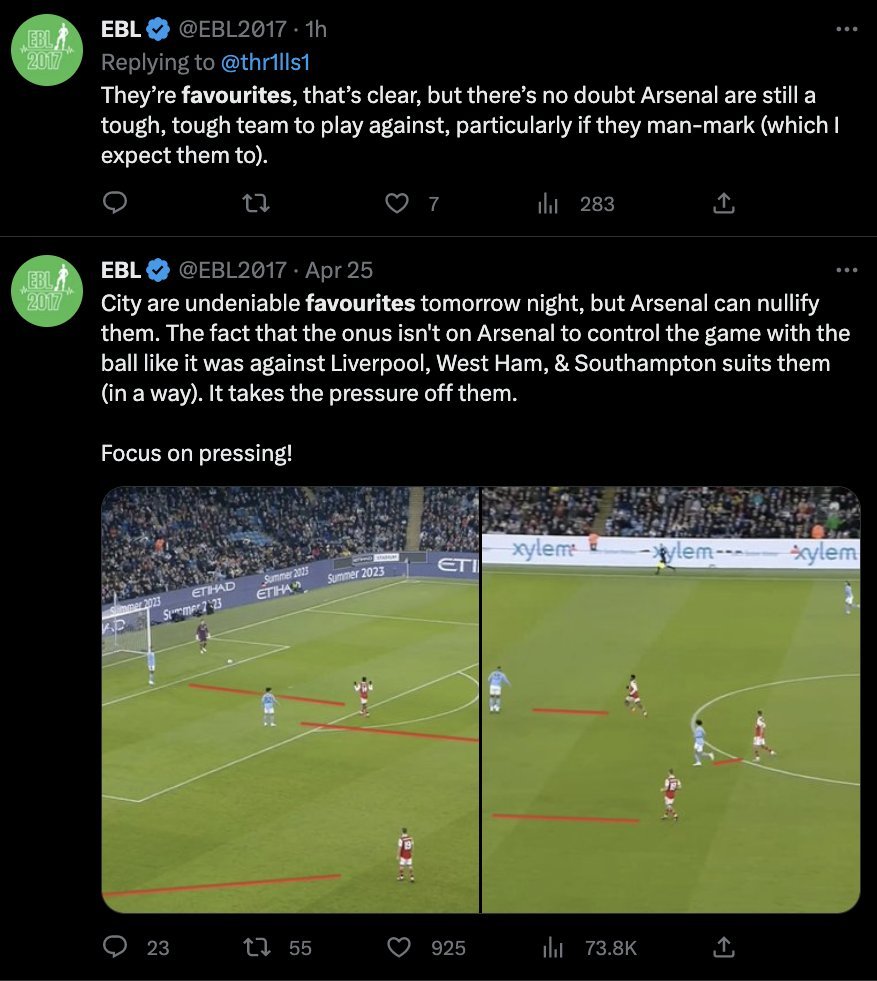Mauricio Pochettino took over both Southampton & Spurs when they were in turmoil. He left a LEGEND as he achieved their highest league position in modern history.
Chelsea need a similar same rebuild *NOW*.
Below, I break down if Pochettino is the man to revive Chelsea.
THREAD!
Chelsea need a similar same rebuild *NOW*.
Below, I break down if Pochettino is the man to revive Chelsea.
THREAD!
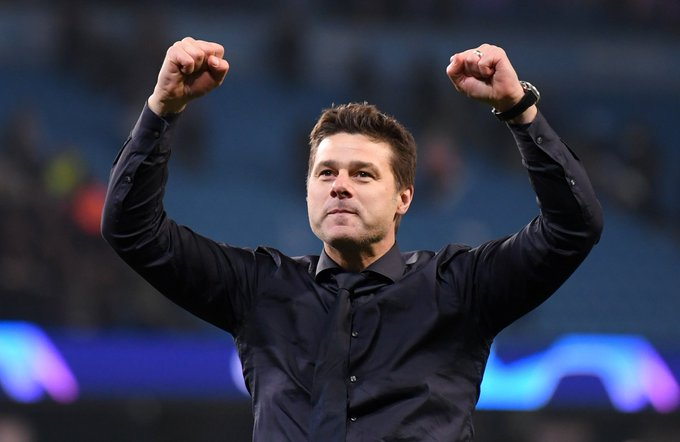
The height of Pochettino's success at both Southampton and Spurs came from playing the same style of football, and that was an all-action, energetic, high pressing philosophy in a 4-2-3-1 system.
His teams were likened to Jürgen Klopp's Liverpool for their high intensity style.
His teams were likened to Jürgen Klopp's Liverpool for their high intensity style.
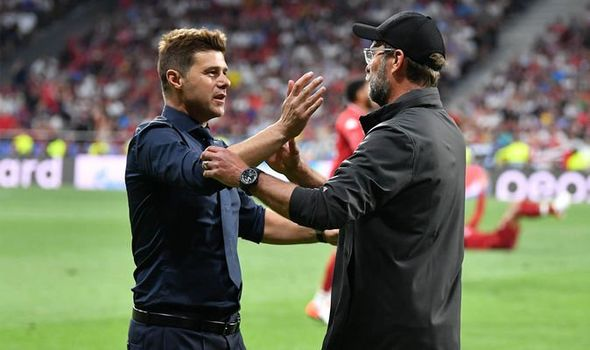
The formula for success was the same in terms of player profile, too, as both Southampton & Spurs had ultra-athletic fullbacks, powerhouses in midfield & attackers in close proximity in the final third.
In fact, Pochettino even brought Wanyama from Southampton to Spurs with him.

In fact, Pochettino even brought Wanyama from Southampton to Spurs with him.
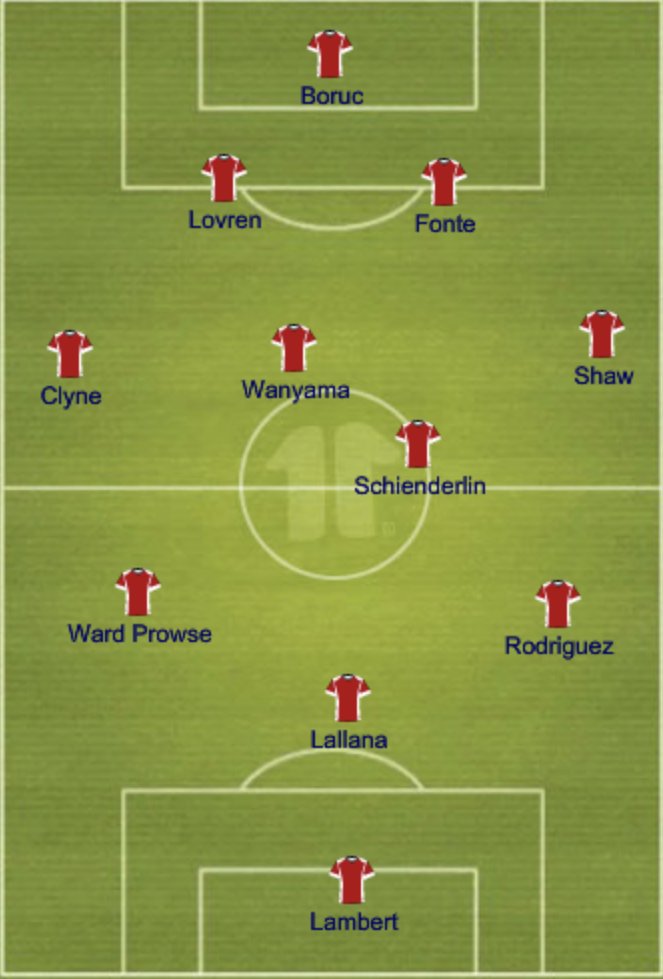
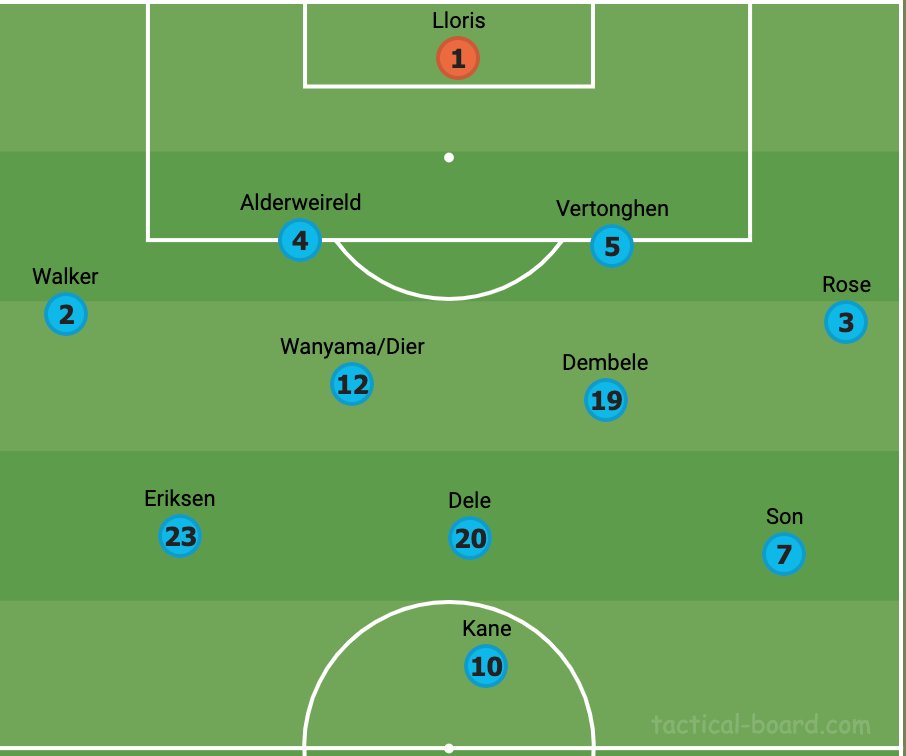
As a Marcelo Bielsa disciple, it is no surprise that Pochettino's style was aggressive, but the general balance provided within each set up was arguably the biggest quality of each respective team.
Let's take the 86 point Spurs team under Pochettino from 2016/17 to assess that.
Let's take the 86 point Spurs team under Pochettino from 2016/17 to assess that.
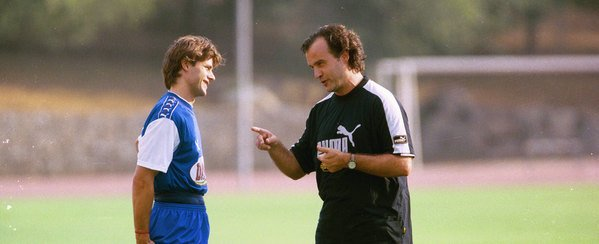
Spurs built play in a 4-2-3-1 shape in the very first phase which transitioned into a 2-2-6 as play advanced into the final 3rd.
Once play was progressed from outside their own half, Spurs' fullback would position themselves high & wide on each flank (Davies out of shot below).

Once play was progressed from outside their own half, Spurs' fullback would position themselves high & wide on each flank (Davies out of shot below).
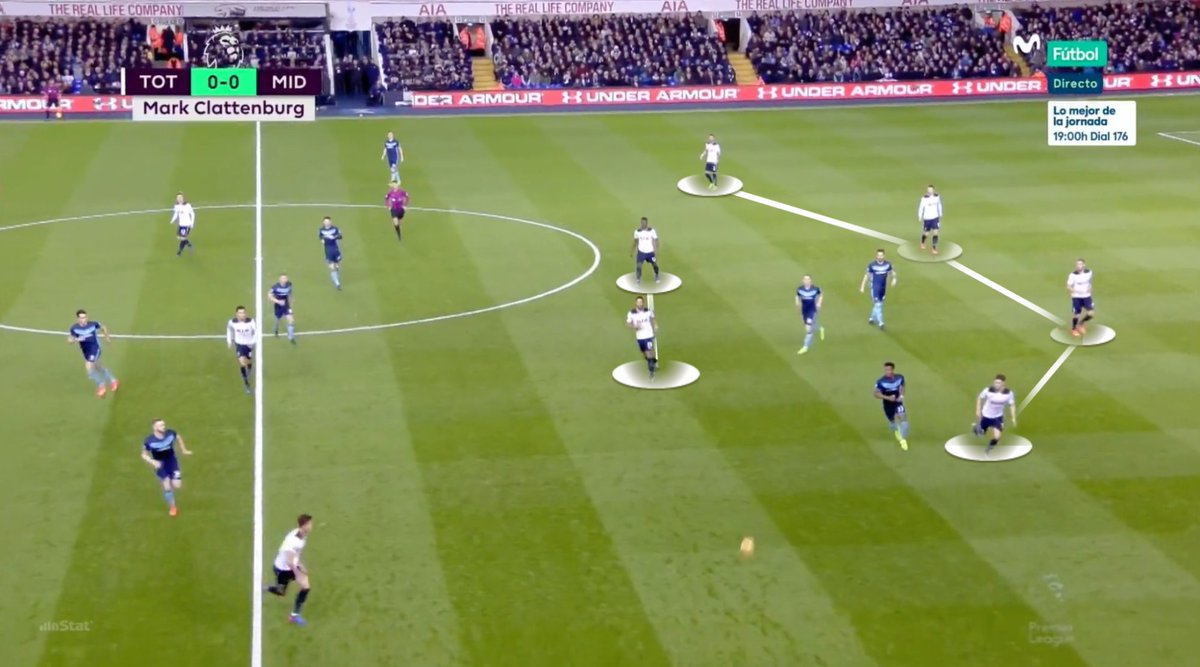
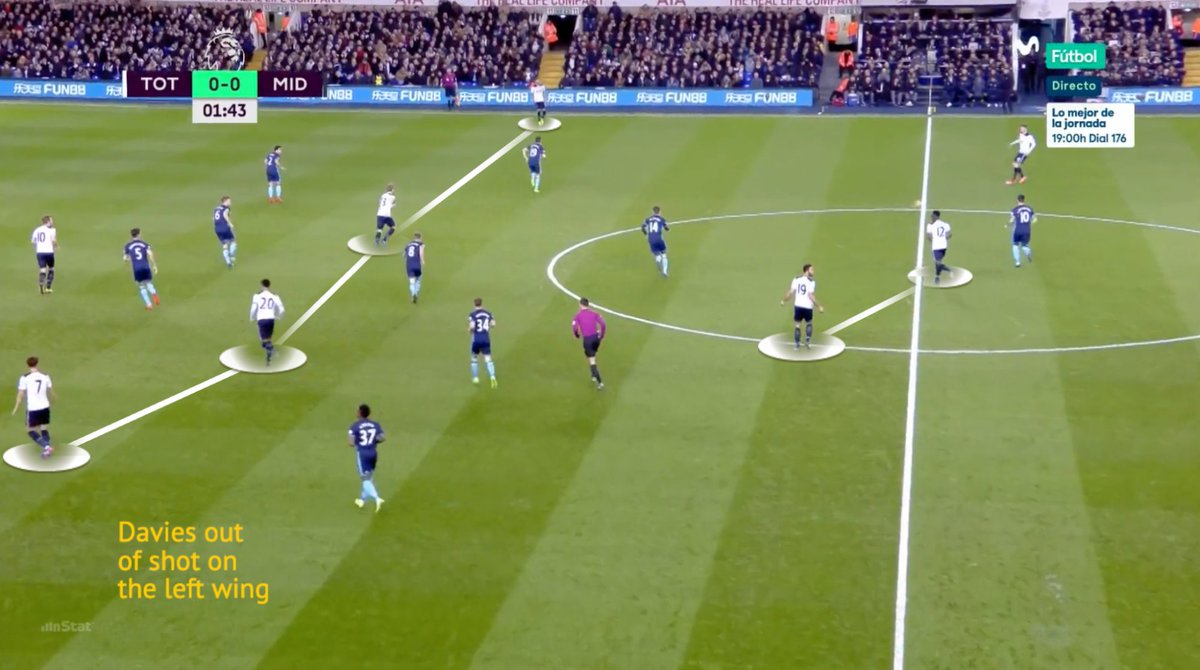
The build-up was heavily reliant on the centre backs and the double pivot to progress play, and because the fullbacks often positioned themselves high in the final third, this gave license to Wanyama and Dembéle to drop and receive outside of the oppositions defensive lines. 
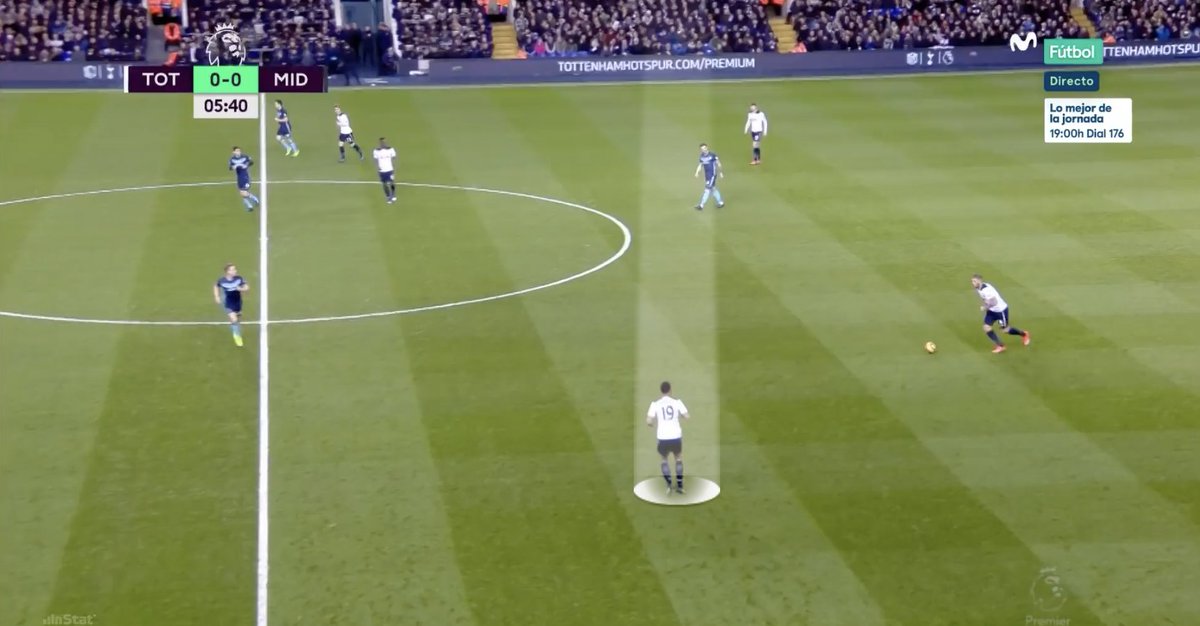
In attack, the high and wide positioning of the fullbacks forced Heung-min Son, Dele Alli, Christian Eriksen, and Harry Kane to tuck inside and operate within close proximity in the final third.
As a quartet, they were arguably the most dangerous front four in the sport.
As a quartet, they were arguably the most dangerous front four in the sport.
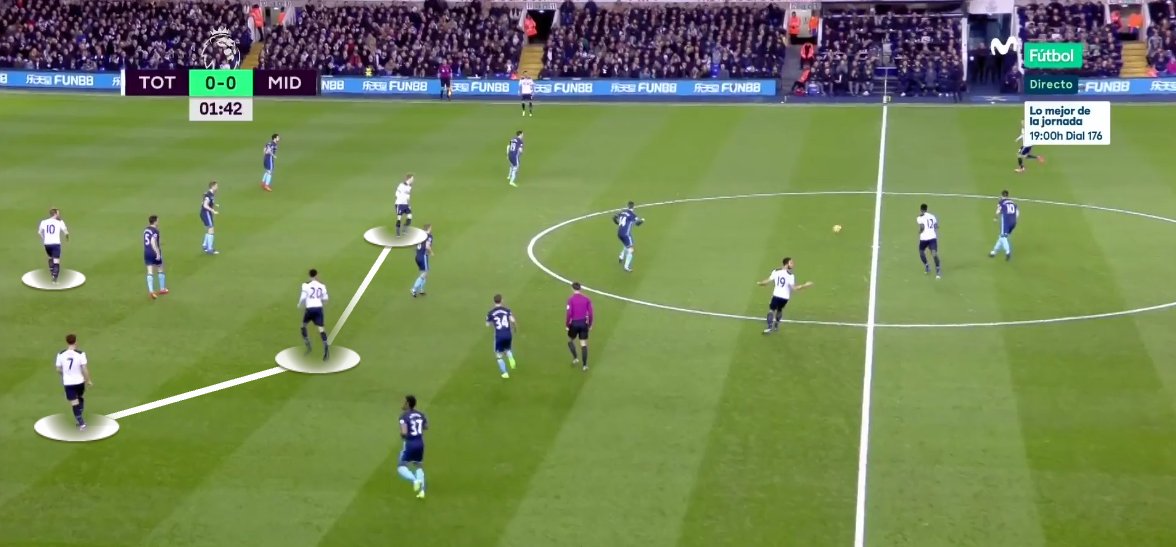
The balance of creativity, penetration, dribbling, interchangeability, and ruthlessness amongst the front four was nothing short of unstoppable, but it wasn't something brand 'new' for Mauricio Pochettino.
He achieved the same thing at Southampton (albeit to a lesser standard).
He achieved the same thing at Southampton (albeit to a lesser standard).
Jay Rodriguez, Adam Lallana, and Ricky Lambert all became internationals for England under Pochettino's tutelage when they were all relative unknowns in world football before that.
The trio along with Stephen Davis operated in similar close proximity and had wonderful balance.
The trio along with Stephen Davis operated in similar close proximity and had wonderful balance.
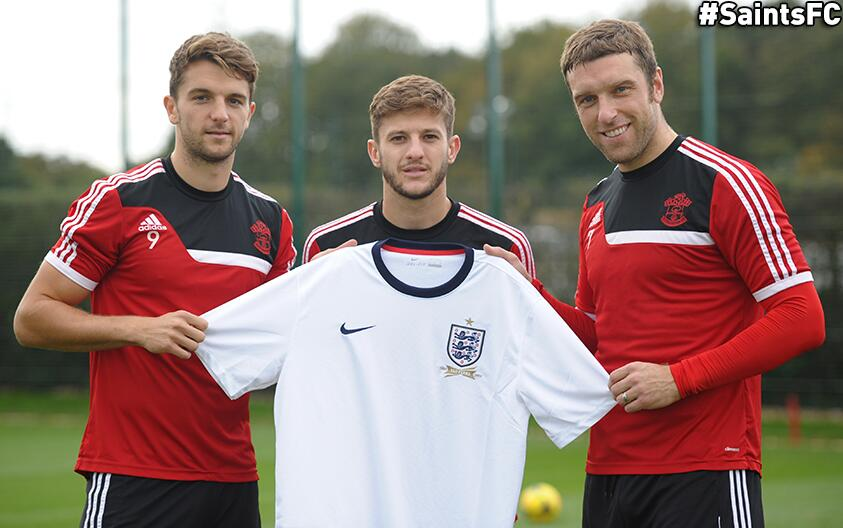
The close proximity of each respective front four was largely enabled by the fact that Pochettino inherited and developed sensationally athletic fullbacks at both clubs.
Kyle Walker and Danny Rose + Nathaniel Clyne and Luke Shaw all developed into England internationals too.

Kyle Walker and Danny Rose + Nathaniel Clyne and Luke Shaw all developed into England internationals too.
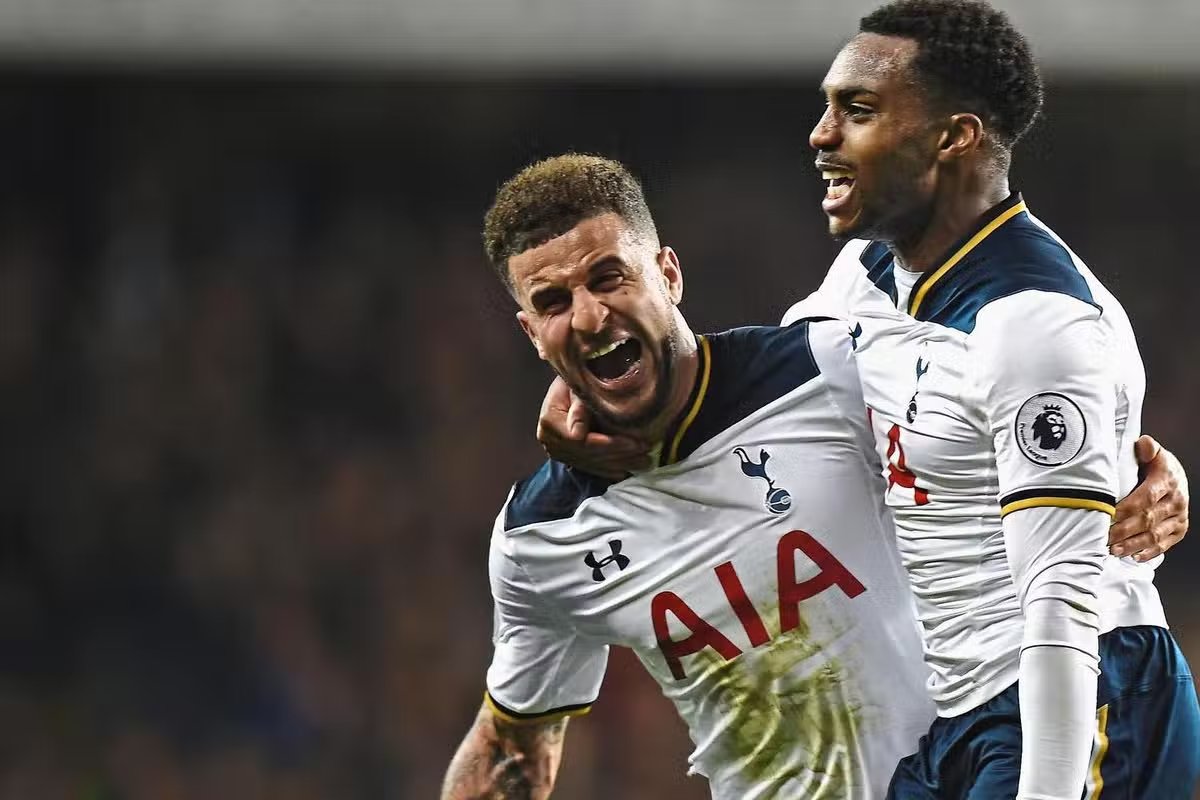
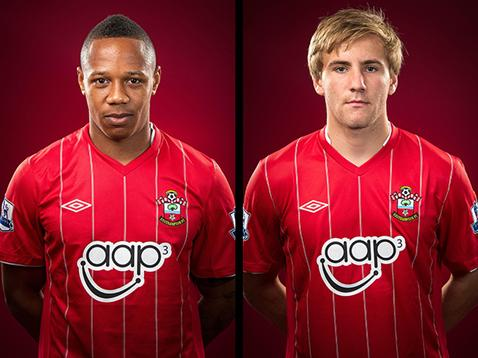
Youth development is one of Pochettino's greatest assets and his track record in developing stars at both Southampton and Spurs is off the charts.
Lallana, Lambert, Shaw, Rodriguez, Clyne, Schneiderlin, Wanyama, Lovren, Ward-Prowse, and Jose Fonte all improved tenfold under him.
Lallana, Lambert, Shaw, Rodriguez, Clyne, Schneiderlin, Wanyama, Lovren, Ward-Prowse, and Jose Fonte all improved tenfold under him.
Poch also unearthed Harry Kane, Dele Alli, Eric Dier, and developed + got the best out of Christian Eriksen, Son, Walker, Rose, Dembéle, & more at Spurs.
The reason he achieved that is because his 4-2-3-1 system was balanced & allowed players to operate in optimal environments.
The reason he achieved that is because his 4-2-3-1 system was balanced & allowed players to operate in optimal environments.
Dele Alli and Adam Lallana played in a #10 role where they could combine their link play between the lines with attacking the box from deep and interchanging with others.
Athletic fullbacks were also given license to fly high whereas Lambert & Kane learnt to link play under him.
Athletic fullbacks were also given license to fly high whereas Lambert & Kane learnt to link play under him.
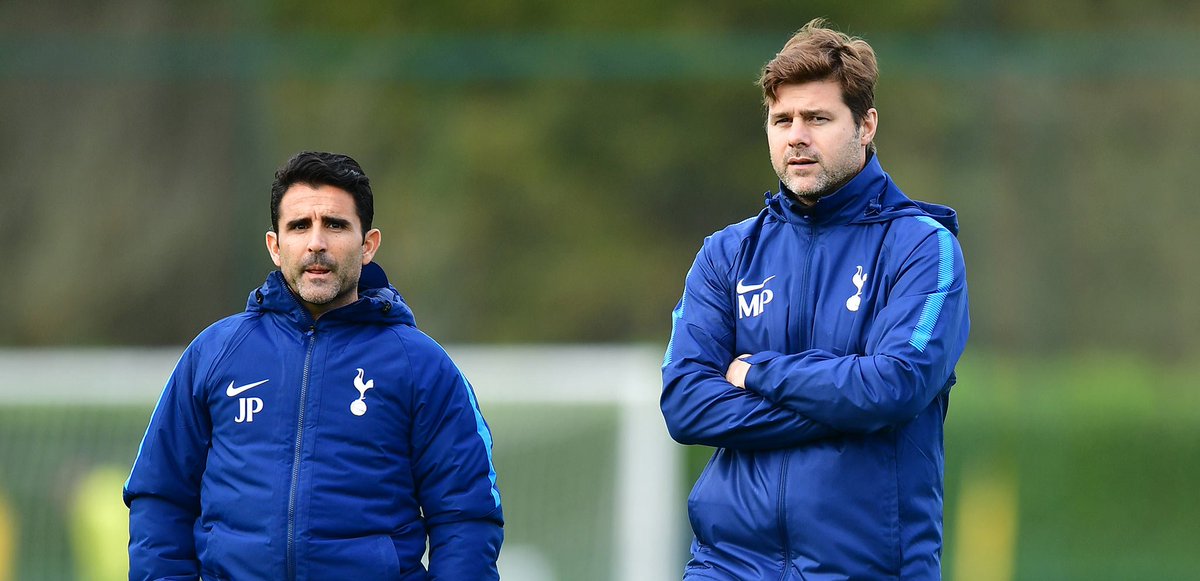
I could go on about his phenomenal player development, but we'd be here all day..
As much as Pochettino teams typically utilised the 4-2-3-1 ➡️ 2-2-6 structure, they were not rigid in their approach.
In fact, they were multifaceted, and that's what made them so good.
As much as Pochettino teams typically utilised the 4-2-3-1 ➡️ 2-2-6 structure, they were not rigid in their approach.
In fact, they were multifaceted, and that's what made them so good.
Ben Davies often played when Danny Rose was injured and he was (and is) naturally more conservative than Rose as a player, so he was less likely to fly high and make a difference on the left wing.
Walker, though, was the opposite, so sometimes the shape resembled a 3-2-5.
Walker, though, was the opposite, so sometimes the shape resembled a 3-2-5.
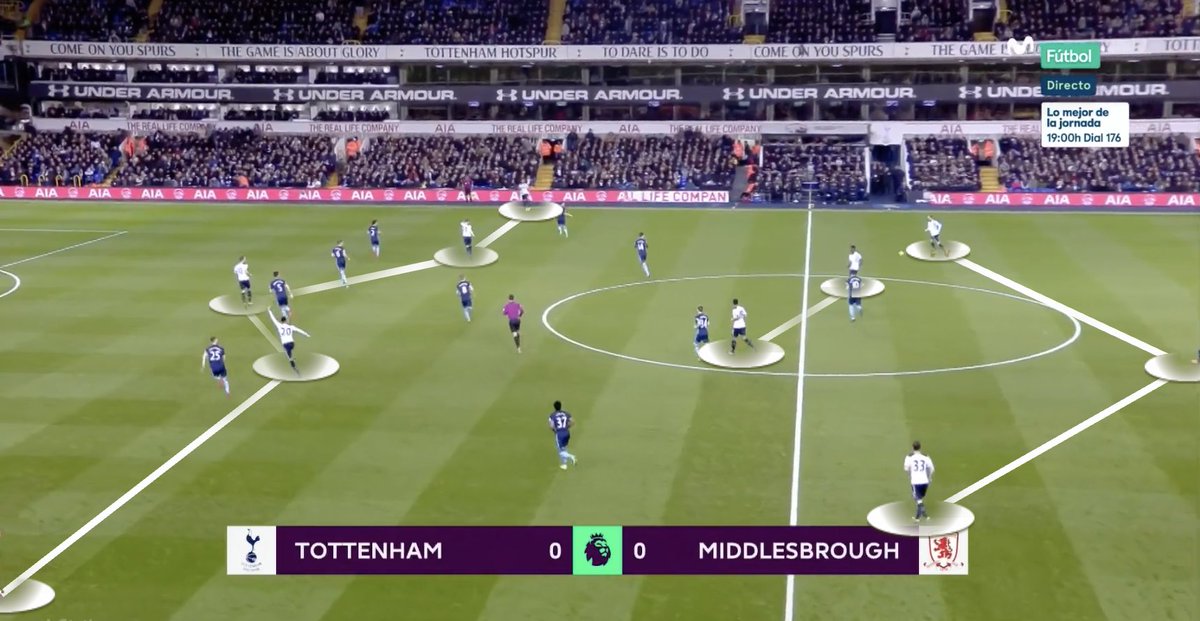
This often saw Spurs attack with 5 in the last line which typically overloaded opposition back 4's in the Premier League as defending with back 5's was less common back then.
Such a structure also enabled Spurs to be ultra compact in defensive transition when attacks broke down.
Such a structure also enabled Spurs to be ultra compact in defensive transition when attacks broke down.
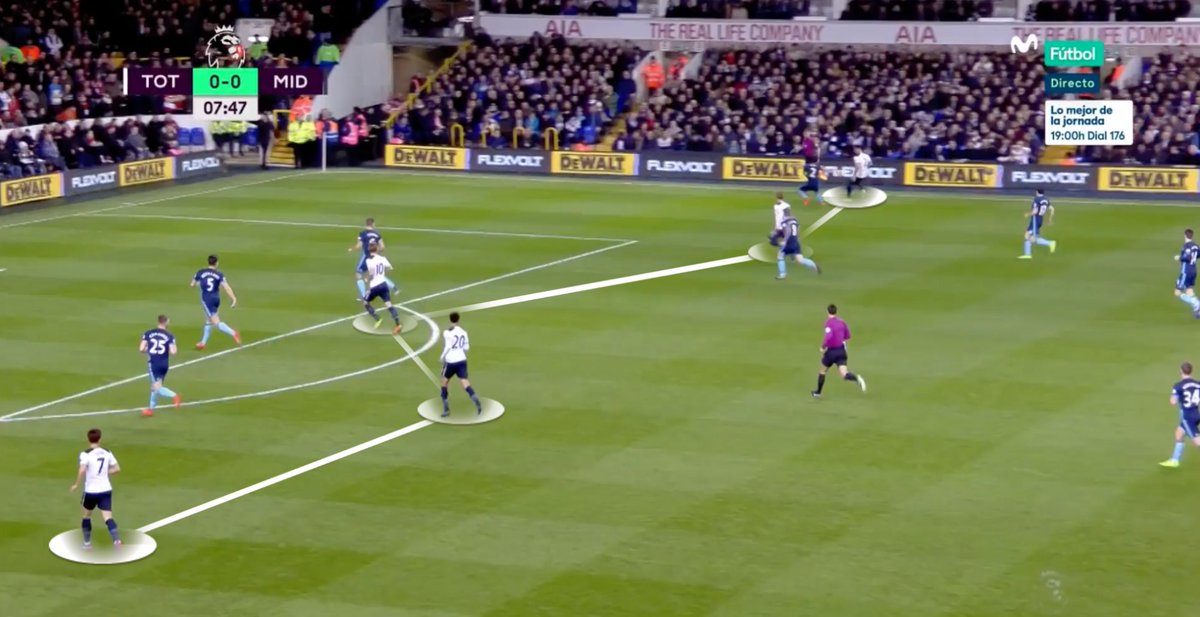
The physical make-up of both Southampton and Spurs was no coincidence. In fact, the inversion of the front 4 into central areas was no coincidence, either.
This was a very specific ploy to dominate the opposition through physical force within a compact structure, and it worked.
This was a very specific ploy to dominate the opposition through physical force within a compact structure, and it worked.
If the opposition went long from a goal kick, Spurs had many players in close proximity ready to pounce on first and second balls.
Spurs themselves often played long into midfield too, purely to create their own transitions which they often dominated due to their compactness.
Spurs themselves often played long into midfield too, purely to create their own transitions which they often dominated due to their compactness.
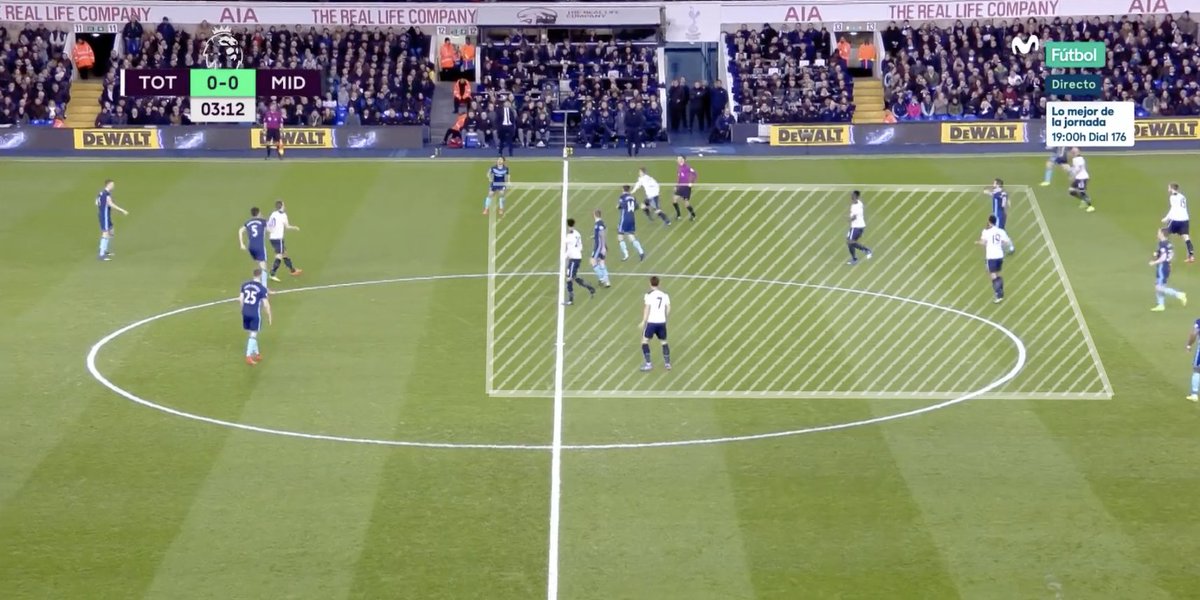
When they retrieved possession their deadly quartet were in close proximity ready to exploit the opposition in defensive transition.
However, if they didn't retrieve possession, Wanyama and Dembéle were present in midfield ahead of the back four to snuff out opposition danger.
However, if they didn't retrieve possession, Wanyama and Dembéle were present in midfield ahead of the back four to snuff out opposition danger.
Eriksen and Son on the sides of Spurs' off-ball 4-4-2 were not tasked with major defensive responsibility in 'rest defence', and that was largely down to the fact that Spurs' fullbacks were so physical that they were trusted to manage 1v1 situations and transitions themselves.
This approach worked, though, and that was largely because Spurs were excellent at creating transitions themselves but also because the Premier League wasn't what it is now back then.
The regularity in which teams kicked long from goal kicks was far higher than what it is now.
The regularity in which teams kicked long from goal kicks was far higher than what it is now.
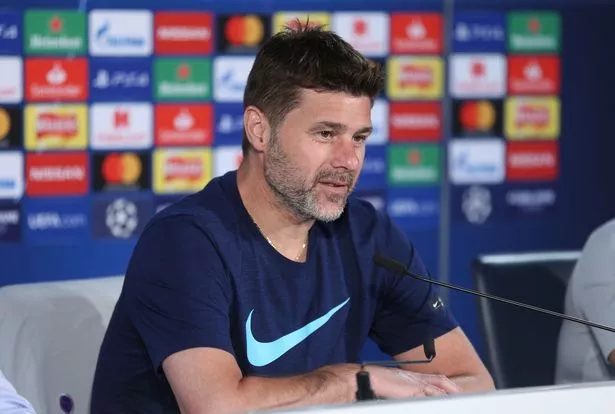
Conte's Chelsea, who won the league that year, often went long from goal kicks themselves.
Not only that, but teams like City & Liverpool who were managed by Pep and Klopp respectively were at the beginning of their process, so even their build-up mechanisms weren't top quality.
Not only that, but teams like City & Liverpool who were managed by Pep and Klopp respectively were at the beginning of their process, so even their build-up mechanisms weren't top quality.
This meant that both Spurs and Southampton's defending was often transition-orientated. The league was far less rigid than it is now when even teams like Brighton incessantly play out from the back.
The hectic style of the league suited Pochettino's teams down to the ground.
The hectic style of the league suited Pochettino's teams down to the ground.
However, Pochettino was tactically versatile in the 86 points Spurs season. He didn't *just* play the 4-2-3-1 system. He also reliably utilised a 3-4-3 shape. This was partly down to the fact that the strength in depth in attack wasn't good, but also because it created overloads. 
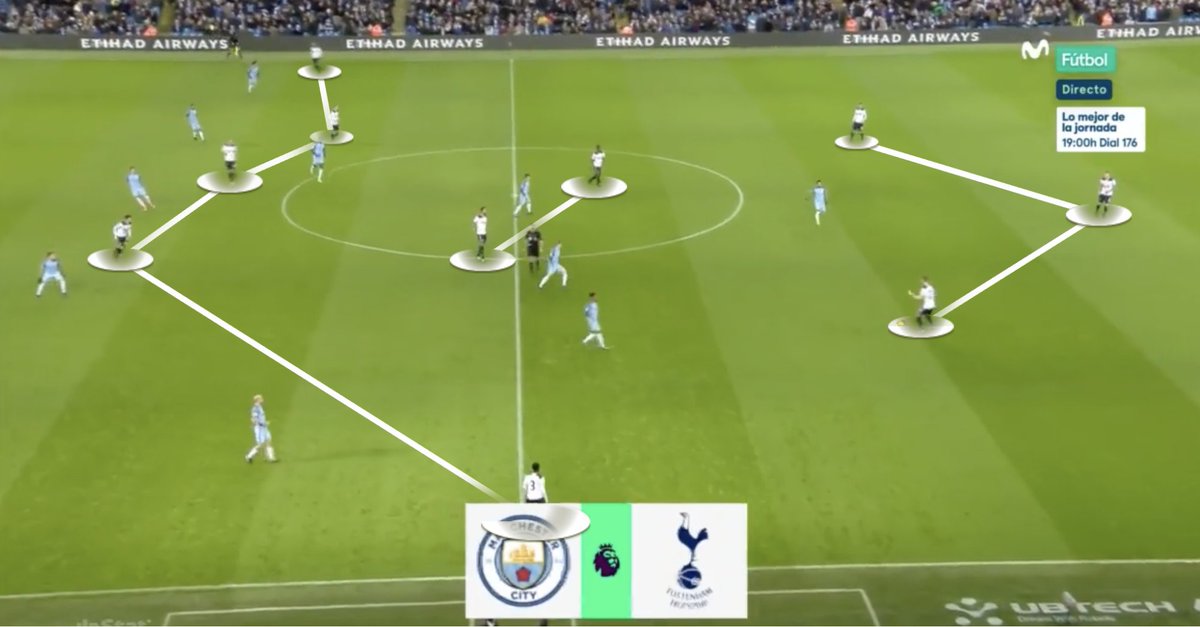
Spurs started off in the very first phase in a 4-2-4 shape with the outside centre backs splitting either side of Lloris, Alderweireld stepping high alongside Wanyama in the double #6, both fullbacks positions themselves high & wide, & Eriksen + Dembéle come into each half space. 
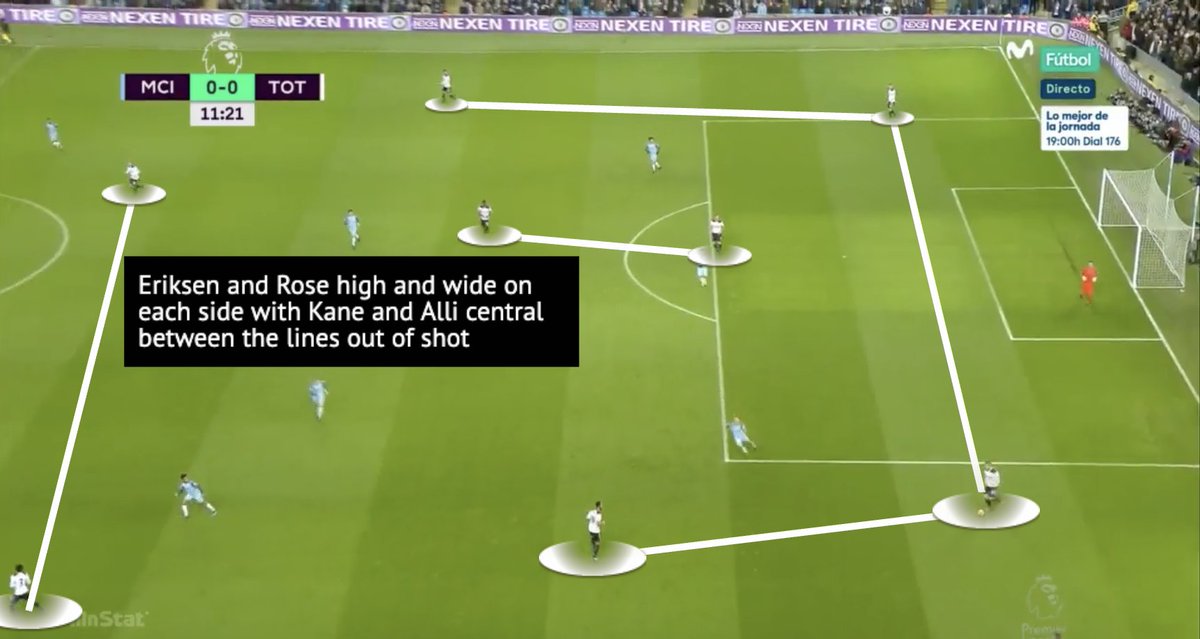
That shape was fluid, though, as sometimes Walker or Rose would stay deep in the half space with Eriksen and Dembéle high.
It largely depended on the players' decisions in each moment (i.e. if Eriksen wanted to drop deep to get touches, Walker would position himself high).
It largely depended on the players' decisions in each moment (i.e. if Eriksen wanted to drop deep to get touches, Walker would position himself high).
Spurs often struggled to play out from the back within that structure, though, and it was largely because their centre backs who split either side of Lloris had to operate in large spaces with uncomfortability ahead of them in the double #6 (both Wanyama/Alderweireld struggled).
However, in the final third, the positional play, combinations, and overall balance was superb and similar to that in their 4-2-3-1.
The reason for the change, though, was to combat teams like Manchester City and Chelsea who attacked with 5 in the last line (or due to injuries).
The reason for the change, though, was to combat teams like Manchester City and Chelsea who attacked with 5 in the last line (or due to injuries).
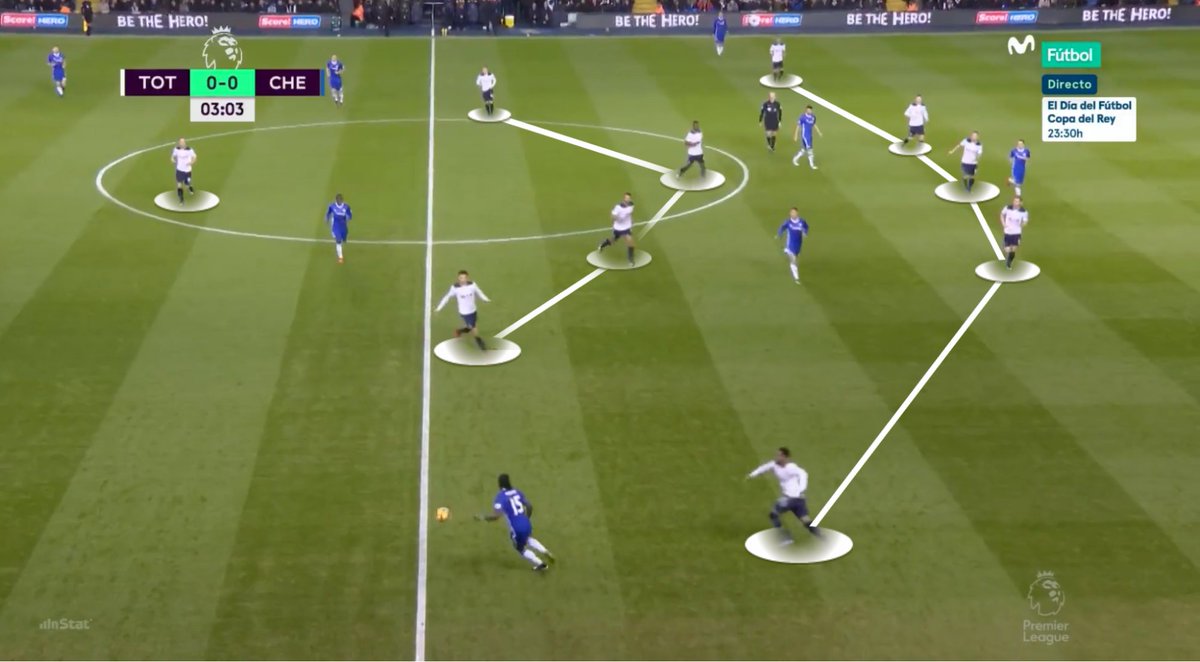
Spurs finished that season with 86 points - a league winning tally in most Premier League seasons. The base of a special team was there, but from then on it all went downhill for Mauricio Pochettino & Spurs.
What happened?
Well, in April 2020, Spurs' net spend was only -£50m.
What happened?
Well, in April 2020, Spurs' net spend was only -£50m.
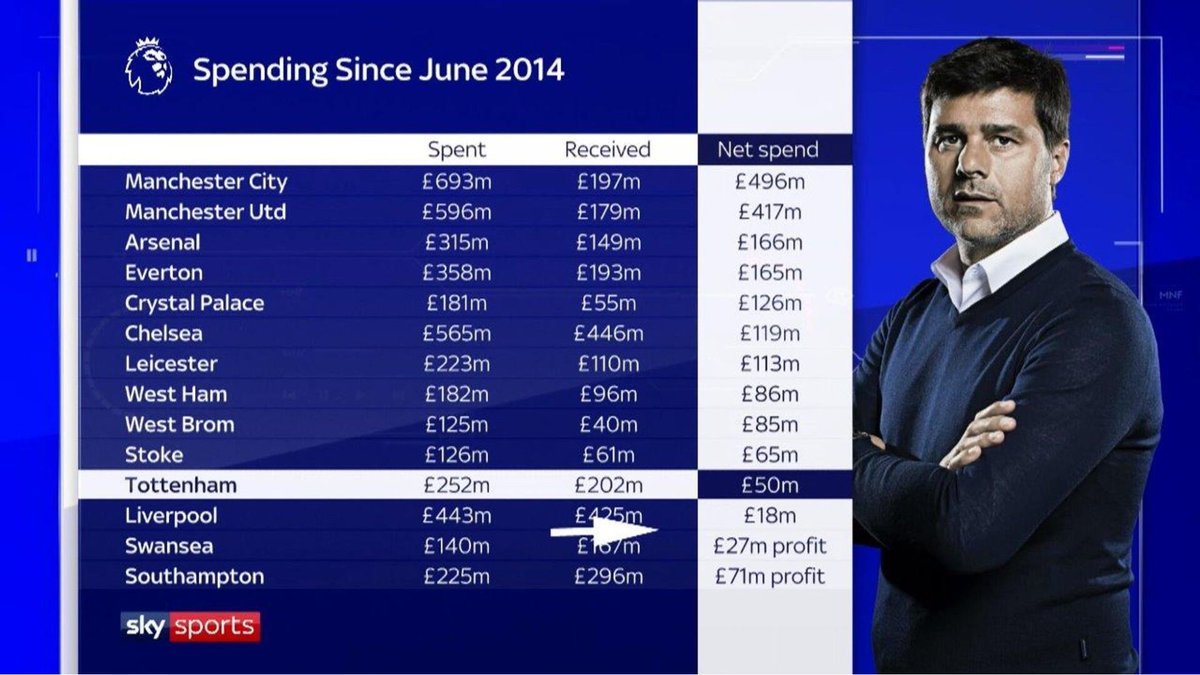
Daniel Levy failed to provide Mauricio Pochettino with the support required to advance the project and to challenge for the league after the 86 point season.
However, not all of the blame can be attributed to Levy, because Spurs did sign players, but the recruitment was poor.
However, not all of the blame can be attributed to Levy, because Spurs did sign players, but the recruitment was poor.
The net spend ahead of the 17/18 season was €20m which is a poor outcome, but Spurs still spent €120m on subpar quality.
When Liverpool, for example, sold Coutinho, they replaced him with Allison and van Dijk.
The net spend was low, but the quality brought in was high.
When Liverpool, for example, sold Coutinho, they replaced him with Allison and van Dijk.
The net spend was low, but the quality brought in was high.
Kyle Walker was sold from the first team & was replaced with Serge Aurier. Kevin Wimmer was sold & replaced with Davinson Sánchez. Extra attacking depth was added in the form of Lucas Moura & Fernando Llorente.
The right positions were upgraded upon, but the signings were poor.
The right positions were upgraded upon, but the signings were poor.
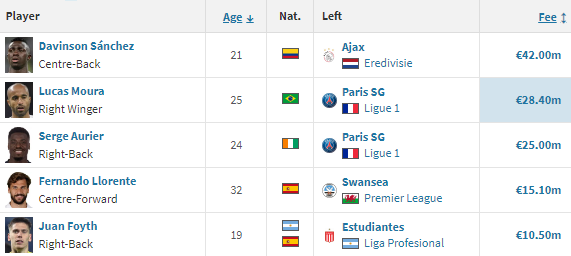
Unsurprisingly, Spurs began to slide down the table and finished 3rd with 77 points.
In 2018/19, they regressed even further by finishing with 71 points after signing nobody and selling an aged Dembéle.
However, they made it to a Champions League final, so how did that happen?
In 2018/19, they regressed even further by finishing with 71 points after signing nobody and selling an aged Dembéle.
However, they made it to a Champions League final, so how did that happen?
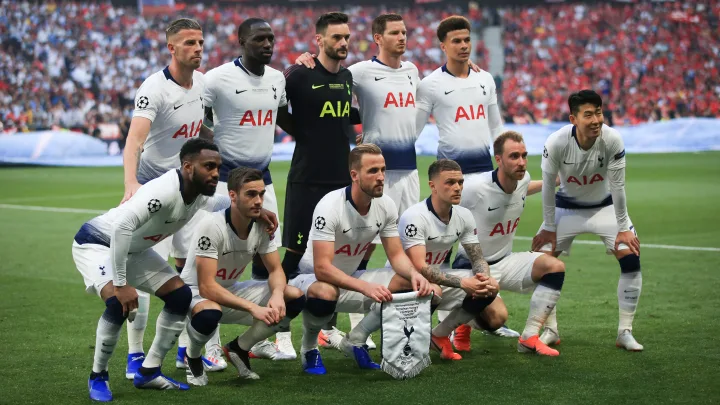
First of all, the make-up of the Spurs team began to diminish.
Their squad depth issues remained as the depth behind the front four was poor.
Sissoko, Dier, & Winks also replaced the ever reliable Dembéle-Wanyama pairing, & Rose had injuries which ended up finishing his career.
Their squad depth issues remained as the depth behind the front four was poor.
Sissoko, Dier, & Winks also replaced the ever reliable Dembéle-Wanyama pairing, & Rose had injuries which ended up finishing his career.
All of a sudden the ultra-physical foundations Pochettino laid at Southampton and Spurs were almost entirely absent.
Ben Davies and Kieran Trippier couldn't dominate the flanks like Rose and Walker did, they missed Dembéle's quality in midfield, and Winks was the wrong profile.
Ben Davies and Kieran Trippier couldn't dominate the flanks like Rose and Walker did, they missed Dembéle's quality in midfield, and Winks was the wrong profile.
Unsurprisingly, their league performance dropped and the likes of Pep and Klopp started to soar ahead of Pochettino, yet they made it to a Champions League final.
I do not mean to diminish the achievement, but they were fortunate to do so. Spurs scraped their way by City & Ajax.
I do not mean to diminish the achievement, but they were fortunate to do so. Spurs scraped their way by City & Ajax.
Spurs progressed against both City and Ajax by beating both teams via away goals, a rule that no longer exists.
City beat them 4.02-2.31 on expected goals (the game finished 3-3), and Ajax were 3-0 up against Spurs before Lucas Moura miraculously scored a hat-trick in Amsterdam.
City beat them 4.02-2.31 on expected goals (the game finished 3-3), and Ajax were 3-0 up against Spurs before Lucas Moura miraculously scored a hat-trick in Amsterdam.
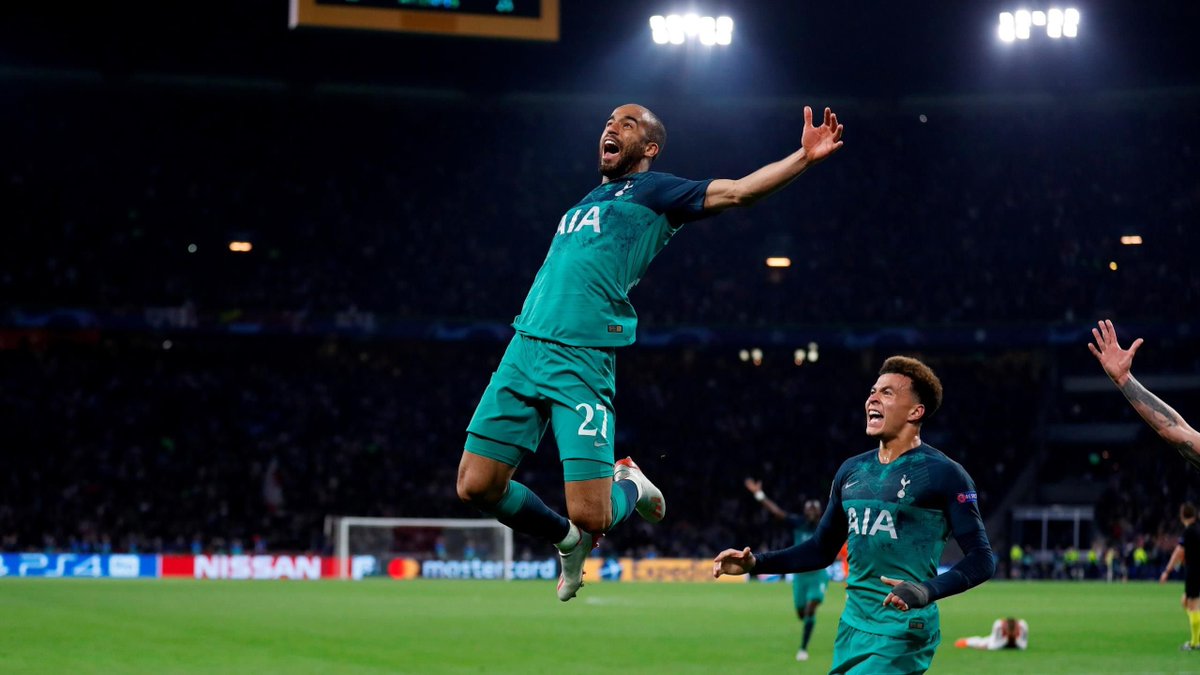
Off the back of the final defeat, Daniel Levy finally got his chequebook out for Pochettino by spending over €125m net spend in one summer.
However, Pochettino did not use the money wisely and signed Ndombele, Lo Celso, and Sessegnon - 3 players who flopped and barely started.
However, Pochettino did not use the money wisely and signed Ndombele, Lo Celso, and Sessegnon - 3 players who flopped and barely started.
The poor squad building resulted in Spurs having to change from their 4-2-3-1 and 3-4-3 altogether because they no longer had the personnel to play it.
Pochettino's solution was to play a woefully balanced diamond system which applied little-to-no pressure on the ball.
Pochettino's solution was to play a woefully balanced diamond system which applied little-to-no pressure on the ball.
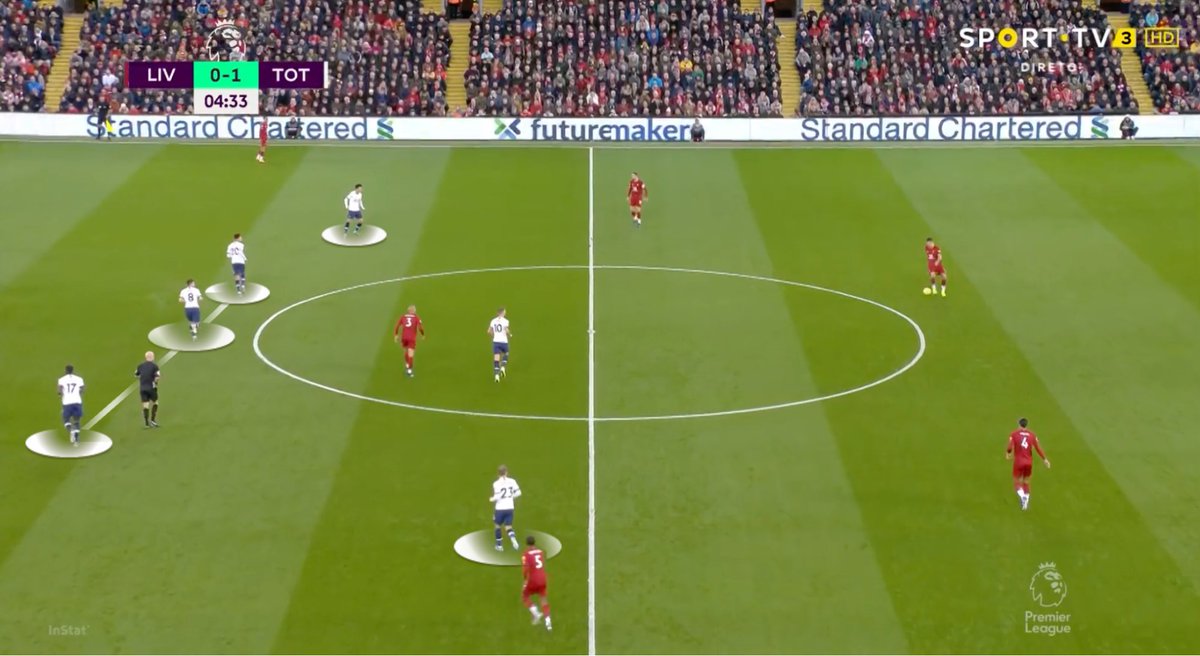
Not only that, but the overall balance was off too.
All of a sudden Alli was playing a box-to-box role which didn't suit his game, Winks was the #6 but lacked physicality, Sissoko had to provide width despite playing a box-to-box role..
Poch's Spurs were a thing of the past.
All of a sudden Alli was playing a box-to-box role which didn't suit his game, Winks was the #6 but lacked physicality, Sissoko had to provide width despite playing a box-to-box role..
Poch's Spurs were a thing of the past.
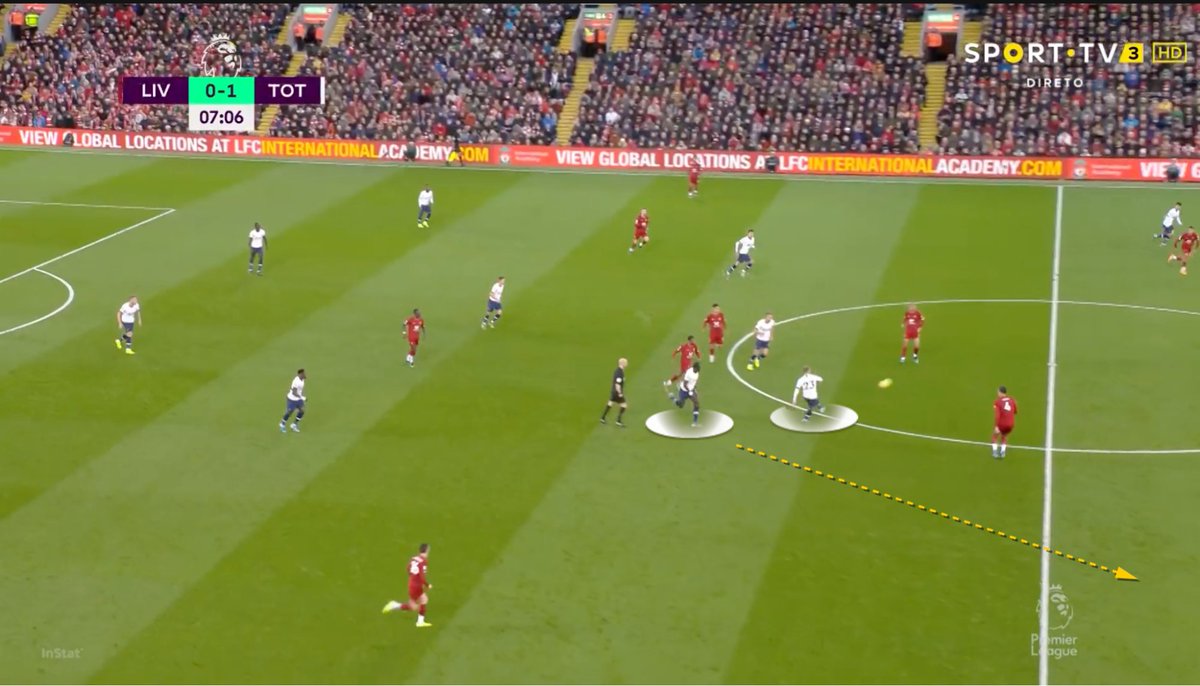
Pochettino left Spurs in 14th place and was sacked on November 21st 2020.
He did an incredible job to begin with, but there is no denying he was largely at fault for the poor rebuild because he wasted virtually all of the money he was provided on subpar quality and profiles.
He did an incredible job to begin with, but there is no denying he was largely at fault for the poor rebuild because he wasted virtually all of the money he was provided on subpar quality and profiles.
Since then, Poch joined PSG & was sacked there too. His first season there was an almighty disaster as PSG lost out on the league title to Lille, but his tactics in the Champions League was the biggest concern of all.
All of a sudden his ultra-physical philosophy became passive.
All of a sudden his ultra-physical philosophy became passive.
Now, it is absolutely normal for a team to be passive with Messi, Neymar, and Mbappé in the front 3 as they are quite simply not going to work hard enough for the unit to press successfully, but that's no excuse for some of the basic tactical errors Pochettino showcased at PSG. 
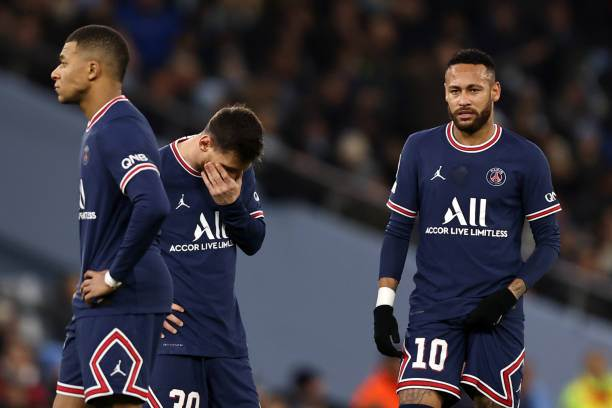
PSG played the same way every time in the CL in Poch's first year:
1) defend deep in a 4-3-3 + rely on heroic defending & missed opportunities from the opposition.
2) rely on magic from the front 3 in transition.
3) rely on elite technical quality to play out from the back.
1) defend deep in a 4-3-3 + rely on heroic defending & missed opportunities from the opposition.
2) rely on magic from the front 3 in transition.
3) rely on elite technical quality to play out from the back.
Unsurprisingly, they were knocked out against Manchester City in his first year at the club.
In his second season, though, he absolutely did improve a lot!
Pochettino went back to his Bielsa-orientated roots and implemented a man-marking system from opposition goal kicks.
In his second season, though, he absolutely did improve a lot!
Pochettino went back to his Bielsa-orientated roots and implemented a man-marking system from opposition goal kicks.
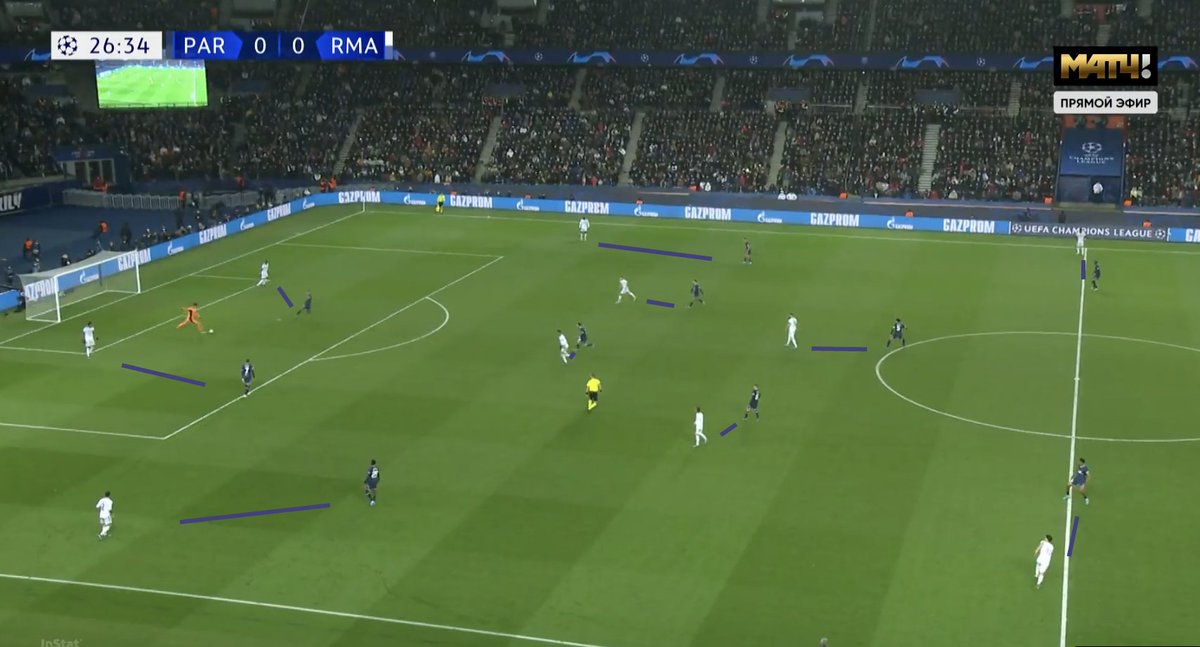
It was always unrealistic to expect PSG to press with reliability in settled play, but there was no excuse for them to fail to press from opposition goal kicks.
He improved upon this flaw, but unfortunately for him Real Madrid were quite simply too good last season & beat them..
He improved upon this flaw, but unfortunately for him Real Madrid were quite simply too good last season & beat them..
Pochettino did win the Ligue 1 title and Coupe de France at PSG, but those are accolades I put little-to-no weight on due to the disparity in quality in the league.
So, from Chelsea's perspective, it's largely unknown relative to what they can expect from Mauricio Pochettino.
So, from Chelsea's perspective, it's largely unknown relative to what they can expect from Mauricio Pochettino.
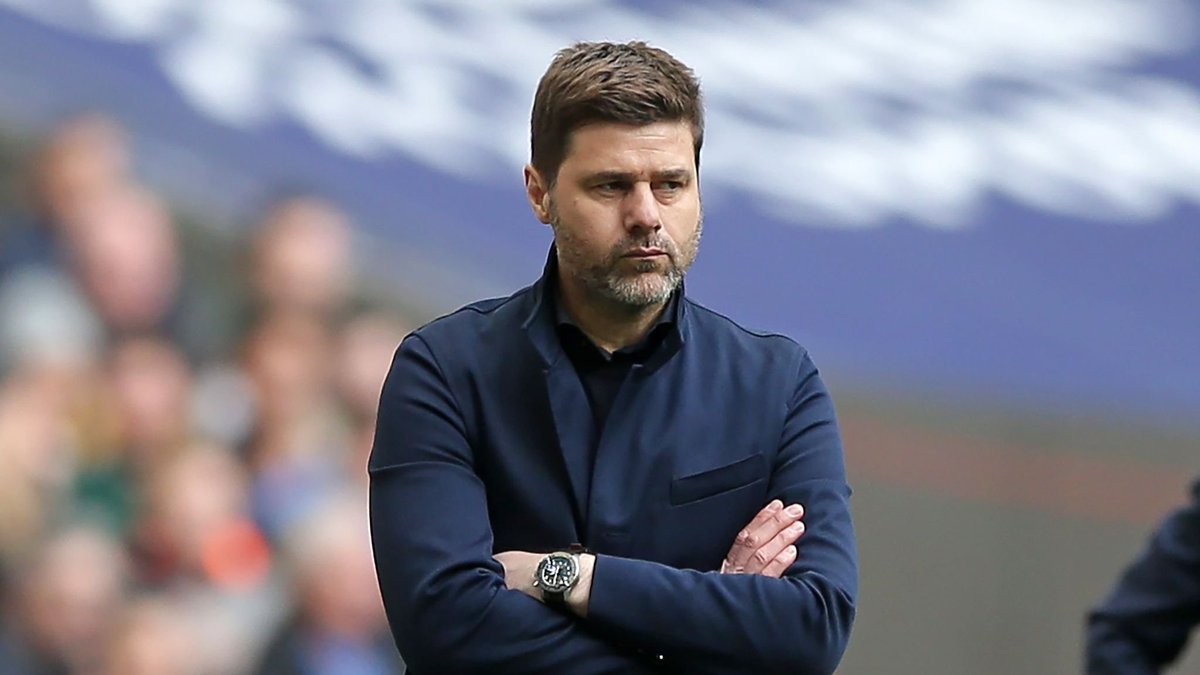
Based on Pochettino's career so far, it could be argued that as football has evolved tactically and that he has fallen behind in that regard.
However, based on his time at Southampton and in his early days at Spurs, it's clear the makings of a top quality coach are there.
However, based on his time at Southampton and in his early days at Spurs, it's clear the makings of a top quality coach are there.
However, again, all we can do is compare him to the elite coaches of the modern day.
How does he compare relative to squad building (not so good), modern day tactics (results here have been mixed), player development (superb), leadership, and dealing with pressure?
How does he compare relative to squad building (not so good), modern day tactics (results here have been mixed), player development (superb), leadership, and dealing with pressure?
There's no doubt the psychological and coaching factors are there.
Poch has demonstrated that throughout his career, but his squad building at Spurs was nothing short of horrendous, and his tactics for the past 4 or 5 years have been a far cry from the elite systems of today..
Poch has demonstrated that throughout his career, but his squad building at Spurs was nothing short of horrendous, and his tactics for the past 4 or 5 years have been a far cry from the elite systems of today..
However, as I say, the foundations of a top tactician were showcased in his early days at Spurs and Southampton, but how does that 4-2-3-1 ➡️ 3-2-5 ➡️ 2-2-6 translate to the modern day? Is it elite *now*?
I would argue that it's not, and for several reasons.
I would argue that it's not, and for several reasons.
I talked before about how most teams went long from goal kicks and the subsequent implications of that on game themes (games were much more transition-based), but I also mentioned how football has evolved.
The quality in the Premier League is so much better, and in all regards.
The quality in the Premier League is so much better, and in all regards.
Peak Spurs pressed with large elements of chaos involved, but the elite teams nowadays have the quality, structure, & emphasis on building out from the back to exploit that.
Below, Lamela comes inside to press Lovren & Milner is isolated at fullback. Top teams will exploit that.
Below, Lamela comes inside to press Lovren & Milner is isolated at fullback. Top teams will exploit that.
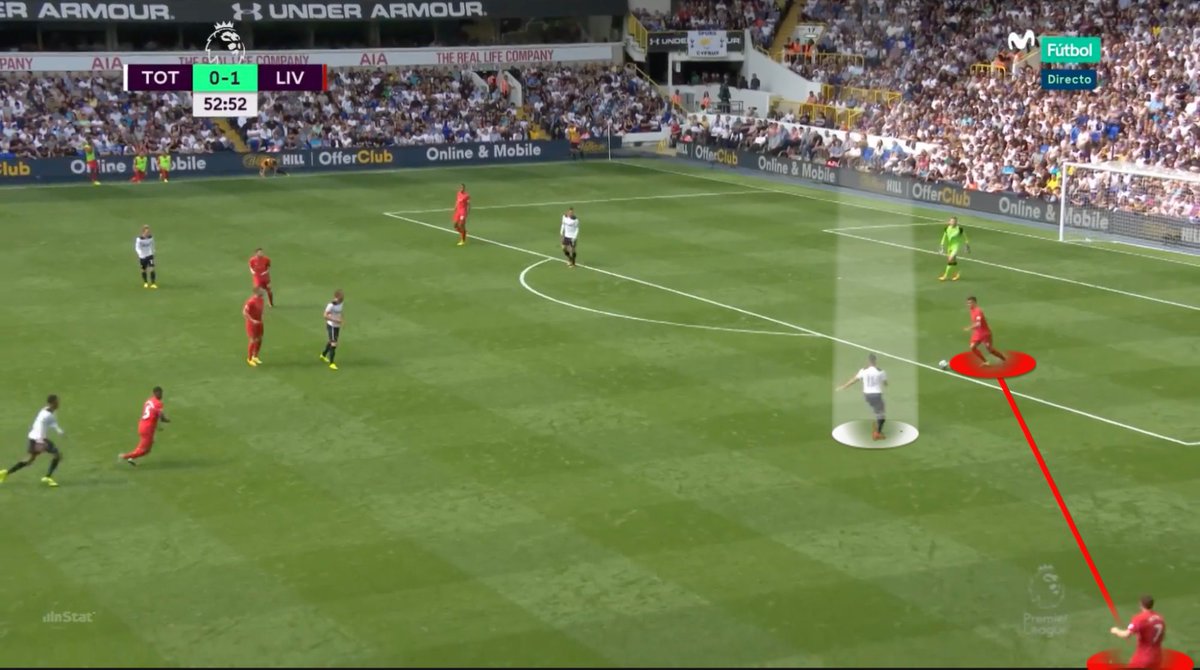
That is simply one example, and I could also point at examples like the below where Pochettino did adapt his pressing structure to deal with a Guardiola team (3-4-1-2 vs City's 2-1-4-3), but it's still unclear whether or not he can recreate a successful style in the modern game. 
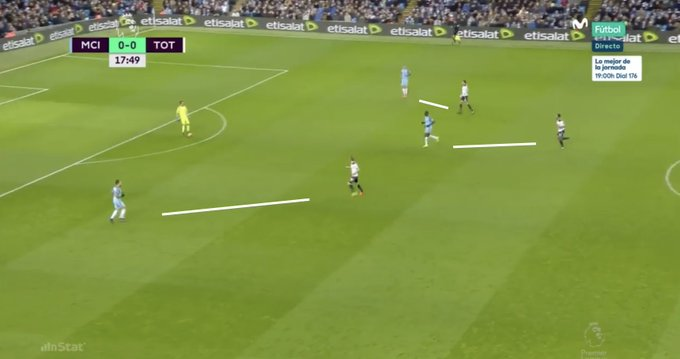
In fact, I would argue that the evidence suggests it's more likely that Pochettino fails at Chelsea as opposed to succeeding.
That's largely because we haven't seen his on or off ball style replicate that of the absolute elite tacticians in the modern day with reliability.
That's largely because we haven't seen his on or off ball style replicate that of the absolute elite tacticians in the modern day with reliability.
In his very best teams the fullbacks received high & wide on the touchline, but the elite Premier League teams play with wingers hugging the touchline.
The elites also often play some sort of variation of the 4-3-3, but Pochettino hasn't done that successfully in his career yet.
The elites also often play some sort of variation of the 4-3-3, but Pochettino hasn't done that successfully in his career yet.
Not only that, but his squad building at Spurs was so poor that he had to change system with regularity. He failed to replace Walker, Rose, Dembéle, Wanyama, and to sign sufficient depth behind the front four to enable Spurs to stick to their best systems (the 4-2-3-1 and 3-4-3).
And, finally, his pressing style that was so successful early on will not cut it in the modern day Premier League that has advanced tactically.
HOWEVER..... as I said, the foundations of a top class coach are there.
Even recently at PSG they man-marked from goal kicks.
HOWEVER..... as I said, the foundations of a top class coach are there.
Even recently at PSG they man-marked from goal kicks.
Pochettino also implemented top pressing displays against a team like Manchester City back in 2016, so he does have the qualities to adapt to the way the elites play.
But, the question is "were they 'one-off' adaptations?"
We don't know if he can repeat that week in, week out..
But, the question is "were they 'one-off' adaptations?"
We don't know if he can repeat that week in, week out..
Time will reveal all and it will certainly be interesting to see how Pochettino has evolved as a tactician because he needs to in order to survive in the best league in the world.
If he has taken his time away from the game to adapt his top quality foundations, he could succeed.
If he has taken his time away from the game to adapt his top quality foundations, he could succeed.
Eddie Howe did the same when he was sacked at Bournemouth.
His methodology was no longer as effective as it once was and he got sacked. This resulted in him taking a long time away from the sport before returning as a top coach.
Mauricio Pochettino needs to do the same.
His methodology was no longer as effective as it once was and he got sacked. This resulted in him taking a long time away from the sport before returning as a top coach.
Mauricio Pochettino needs to do the same.
Poch has lots of top qualities (player development, psychological qualities, track record of rebuilds) but also struggles regarding squad building and the translatable qualities of his best system don't cut modern 'elite' parameters (fullbacks high + wide, chaotic pressing).
He has showcased elite pressing displays, though, against the likes of City in 2016 where there were no spare men across the park and for PSG in the Champions League where he man-marked from goal kicks, but they were "once offs"?
How will his teams play every week? It's unclear.
How will his teams play every week? It's unclear.
All in all, the job Pochettino did at Southampton & Spurs warrants an opportunity to work at the top level again, particularly in what can be considered a 'normal' environment where he can forge his own coaching qualities on the team.
Let's see how it plays out for Chelsea..
🛑
Let's see how it plays out for Chelsea..
🛑
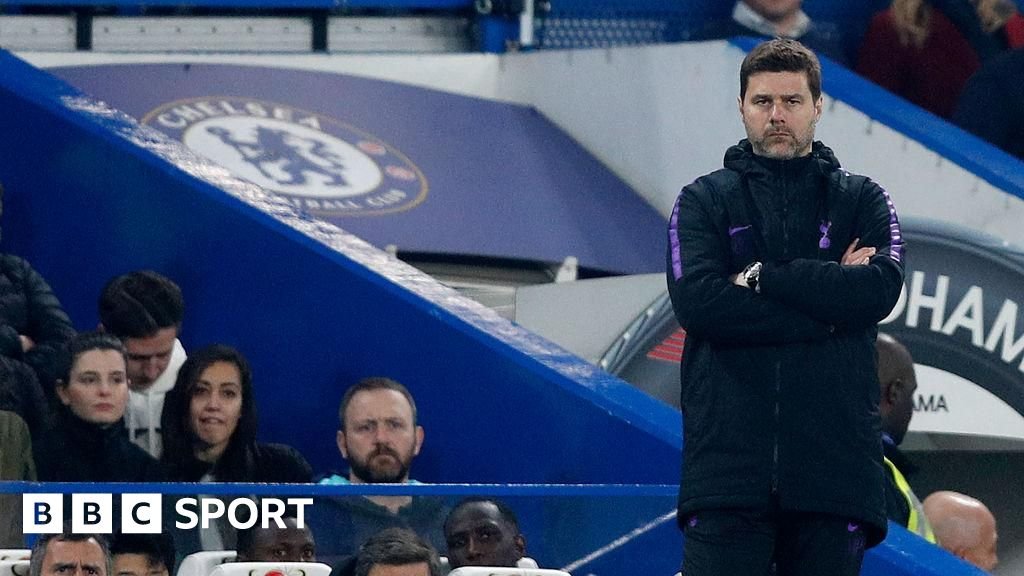
• • •
Missing some Tweet in this thread? You can try to
force a refresh

 Read on Twitter
Read on Twitter

